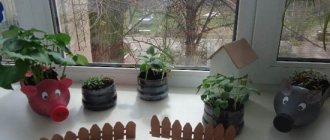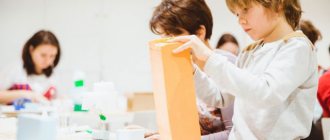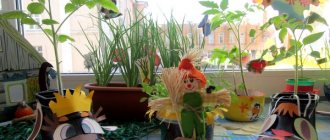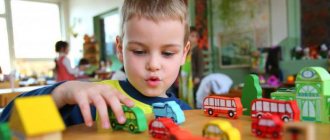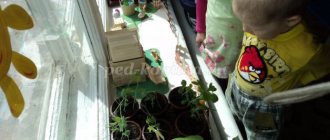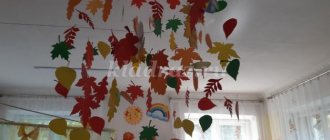Project “Vegetable garden on the windowsill” in the second junior group
Project type:
- Focus: informational and educational.
- By number of participants: group.
- Duration: short-term.
Project participants:
- Children of the 2nd junior group.
- Educators.
- Parents.
Project activity base:
MBDOU "Kilemarsky kindergarten "Teremok"
Implementation time: 1 month.
Relevance of the project.
Many parents who have their own gardens (dachas) do not suspect that the green kingdom will begin to arouse the child’s great interest if adults teach them to observe the plant, to see in the green sprout a special living creature, whose life depends entirely on whether it receives care or not. Only with the help of adults can a preschooler understand that the life of a plant depends on the presence of heat, light and good soil, and learn to distinguish a healthy and strong plant from a weak, frail one that requires “treatment.” Having learned to understand the condition of plants, the child will sympathize and care for the plants.
Hypothesis.
We assume that a preschooler who has gone through the “school” of caring for garden crops on the windowsill will participate in feasible labor of growing vegetables in the garden along with his parents. And parents, having received the necessary advice and recommendations, will involve the child in joint activities in growing vegetables.
Problem.
Children of primary preschool age do not have sufficient understanding of plants, where they grow, the necessary conditions for their growth, and their interest in cognitive and research activities is not sufficiently developed.
Children do not have enough knowledge about habits that are beneficial to human health.
Objective of the project.
- To develop children's interest in experimental and research activities in growing cultivated plants indoors.
- To instill in children a love of nature.
- Create a vegetable garden on the windowsill in the group.
Project objectives.
- To provide knowledge that plants are alive, they are watered, planted, and grown from seeds.
- Expand children's knowledge and understanding of the beneficial properties of vegetables (onions, garlic, beetroot, lettuce), their structure and the conditions necessary for their growth.
- Clarify adults’ ideas about work, teach children to correctly name labor actions.
- To foster a caring attitude towards one’s health, to clarify children’s knowledge about habits that are beneficial to human health.
- Foster hard work and respect for plants.
- Get positive emotions from the results obtained.
- Enrich vocabulary, develop children's coherent speech.
- Create conditions for parental participation in the educational process.
Main directions of the project.
- Working with preschoolers.
- Working with parents as a result of the implementation of the “Vegetable garden on the windowsill” project.
Expected results.
- Children will gain knowledge that plants are alive, they are watered, planted, and grown from seeds.
- Children will gain an understanding of the work of adults and will learn to correctly name labor actions.
- Children will take care of their health.
- The work carried out allows us to cultivate hard work and caring attitude towards plants.
- All project participants (children, teachers, parents) will receive positive emotions from the results obtained.
The success of the implementation of tasks is ensured by the construction of a system of work in this area, which includes the following components:
- Creation of a subject-developing environment;
- Working with parents.
One of the most important conditions for solving problems is the organization of a developing subject environment. The object environment surrounds the child and has a certain influence on him from the first minutes of his life. It is important that it becomes developmental, that is, it ensures the development of active independent children's activities. However, in order for the subject material that is given to children for free use to become a stimulant, a source of research and search activity for preschoolers, they must have a minimum of knowledge and methods of action on which to rely.
Professional training of teachers: seminars, round table, visiting educational activities, taking courses.
Work with preschoolers includes:
- Selection and examination of illustrations.
- Organization and conduct of experimental activities: “Vegetable garden on the windowsill.” Planting vegetables: onions, beets, oats, radishes, beans, etc.
- NOD “I am friendly with health, I want to be healthy.”
- Conversation: “Caution – germs.”
- Carrying out observations of plant growth with recording changes in growth (photo, “Observation Diary”).
- Planting vegetables at home with parents (recommendations).
- Caring for planted plants through observation (watering, loosening the soil).
- Selection and reading of fiction.
- Selection and guessing of riddles on the topic “Vegetables”, poems.
- Children's independent activities, coloring vegetables, drawing microbes.
- Organization and conduct of didactic games to consolidate knowledge about vegetables: “Wonderful bag”, “What has changed”, “What is being planted in the garden”, “Guess by the description”, “Fold the picture”, “The fourth one is extra”.
- Decorating a vegetable garden in the style of a small rural courtyard: “A house in the village” where they live, Grandfather dressed in a hundred fur coats and Lukovka. They “grow” vegetables in the garden beds. Children in a playful way get acquainted with everyday life and farming, the inhabitants of a rural courtyard, with tools, agricultural machinery, and observe the growth of plants.
Joint activities of children and parents:
- Planting some crops (flowers - bulbous) at home with children.
Working with parents:
- Discussion of this issue at the parent meeting, February 27.
- Conversation with parents “Vegetable garden on the windowsill” (at a meeting).
- Help from parents in purchasing equipment, seed material for a garden on the window, in making attributes for the garden: Grandfather - a hundred - fur coats - dressed, Onion, stuffed animal, well, hen with chicks, “dog”, tree, rug, sun and clouds , zone: “Pond”; planting some crops at home with children.
- Consultation: “Vegetables and fruits are healthy foods”
Working with society: cooperation with colleagues.
Stages of work:
Stage 1 – information and analytical (end of February – beginning of March).
Target:
- Study methodological, popular science and fiction literature on the topic.
- problem definition,
- choosing a project goal,
- collection of information material,
- creating conditions for organizing work in the “window garden”,
- drawing up an action plan for organizing children's activities
- introducing children to a problematic play situation,
- children’s entry into a problematic play situation (the leading role of the teacher).
At this stage it is necessary to identify the problem:
Preschool childhood is the initial stage of the formation of a person’s personality and his value orientation in the world around him. During this period, a positive attitude towards nature, towards the “man-made world”, towards oneself and towards the people around them is formed.
The formation of the beginning of an ecological culture in children contains a variant of specific technologies built on organizing the interaction of preschool children with nature, the immediate environment, and knowledge of what grows and lives next to them.
In connection with this, it seems important to create a developing ecological environment, which, if properly structured, improved and subsequently used in pedagogical activities, acts as a method of environmental education of children.
Action plan:
- Conversation with parents “Vegetable garden on the windowsill.
Purpose: Discuss the goals and objectives of the project. Generate interest among parents in creating conditions for the implementation of the project.
- Selection of visual teaching aids, demonstration material, natural material, fiction and scientific literature, acquisition of necessary equipment.
Goal: To create conditions for the implementation of the project “Vegetable garden on the windowsill.
2nd stage – implementation (collection and analysis of information), (1st - 3rd week of March)
Inclusion of each child in practical activities to achieve a high level of knowledge, skills and abilities.
Implementation of the project: “Vegetable garden on the windowsill” - planned activities are carried out to implement the project (conversations, experiences, experiments, creative activities, viewing illustrations, reading, independent activities of children).
Action plan:
- Looking at books and illustrations about plants.
- Practical activities: planting onions, beets, oats, radishes.
- Experience - observing the growth of onions, beets, oats, beans, flower crops (gladiolus, lily).
- Examining flower seeds through a magnifying glass.
- Practical activity: growing seedlings.
- Experience - observing the growth of onions in different conditions (water, soil).
- Didactic game “Wonderful bag”, “What has changed”, “What is being planted in the garden”, “Guess by the description”, “Fold the picture”, “The fourth is extra”.
- Observations: “Are our plants growing?”
- Making an observation diary.
- Final conversation “Vegetable garden on the windowsill.”
- NOD “I am friendly with health, I want to be healthy.”
3rd stage – final, (4th week of March)
- GCD (final) “I am friendly with health, I want to be healthy.”
- Final conversation, summing up.
Project support:
Technical: stereo system, computer, digital device, video projector.
Personnel: relationship with the methodologist of the preschool educational institution.
Informational: methodological and fiction literature, materials for events with preschoolers, illustrations, card indexes on the topic.
Regulatory: compliance with SanPiN in terms of regime, organization of children's activities in preschool educational institutions.
Financial: from own funds, sponsors’ funds.
Conclusions:
- The children got acquainted with wild and cultivated plants.
- Children develop an interest in experimental and research activities in growing cultivated plants indoors.
- As a result of practical and experimental activities, children received the necessary knowledge and skills (conditions for plant growth).
- We learned all about the benefits of vegetables, fruits and taking care of our health. Strengthened good habits for human health.
- The children saw the variety of seeding material.
- Children have become more careful about the plant world.
- The group created a vegetable garden on the window.
- Children have become more respectful of work.
- Observations of plants were recorded in an observation diary.
- Parents took an active part in the “Garden on the Window” project.
Summary of the lesson “Vegetable garden on the windowsill” in the first junior group
Anastasia Toropova
Summary of the lesson “Vegetable garden on the windowsill” in the first junior group
Maslenitsa week has passed, we spent the winter and are looking forward to spring. I already want to see primroses , leaves on the trees and the first greenery in the gardens . Of course, the primroses and leaves are still about a month away, but we can see the greenery in the garden . How can you ask? We bring to your attention a vegetable garden on the windowsill .
A vegetable garden in kindergarten promotes the development of curiosity and observation in children, and this helps to better understand plant life. He is able to expand children's ideas about plants as living organisms, about the conditions necessary for growth and development, develop aesthetic feelings, the ability to enjoy the beauty of grown plants and the results of their work. And how much joy the first plantings and shoots .
of the first junior group of MBDOU d/s No. 24 planted their first “ Garden on the windowsill . The garden turned out bright and colorful.
The children learned the steps of planting onions, garlic and peas and are now looking forward to the first shoots , of course, not forgetting to water their plantings.
group's teachers set a goal to expand children's understanding of how to care for plants indoors, to introduce them to the need for light, heat, moisture, and soil for plant growth. Develop the cognitive and creative abilities of children at a young age .
Very soon the first shoots , the guys will definitely taste the greens they planted and grew with their own hands.
Photo report “Vegetable garden on the windowsill” in the kindergarten group “Vegetable garden on the windowsill” in the kindergarten group The influence of the surrounding world on the development of a child is enormous. Getting to know the endless, constantly.
Summary of a lesson on speech development in the first junior group "Granny's garden" Summary of a lesson on speech development in the first junior group Topic: "Grandma's garden" Educator: Karmeeva L.V. Purpose: To consolidate concepts.
Summary of a lesson on the sensory development of children of the first junior group “We have a vegetable garden” Summary of a lesson on the sensory development of children of the first junior group “We have a vegetable garden.” Goal: To form elementary ideas in children.
Vegetable garden on the windowsill “Not a vegetable garden, but a fairy tale” “People are noisy at the gate. Where is the winter garden? They say it grows there. Cucumber seedlings. And dill and onion. Everyone looks at the garden and leaves.
Project for children of the second junior group “Vegetable garden on the windowsill” Project “Vegetable garden on the windowsill” Prepared by: Gridchina I. G. April - May 2021 Term: short-term (7 weeks) Type: educational.
Environmental project in the senior group “Vegetable garden on the windowsill” Municipal budgetary preschool educational institution “Uzhur kindergarten No. 1” Environmental project “Vegetable garden on the windowsill”.
Project in the early development group “Vegetable garden on the windowsill” Project in the early development group “Vegetable garden on the windowsill” Educators: Kotlyarova T. P. Filipenko O. V. 2021 Project goal: Decoration. Vegetable garden on the windowsill using the origami technique “Fun Vegetable Garden” Cheerful Vegetable Garden In the spring of 2021, the children of the middle group, as well as the junior group, and I worked in two groups according to the schedule (three shifts each.
Excursion to the vegetable garden in the first junior group Purpose: 1. Give children an idea of vegetables; about the work of adults in the garden. 2. Activate children's vocabulary with words: vegetables, garden, carrots.
Source

